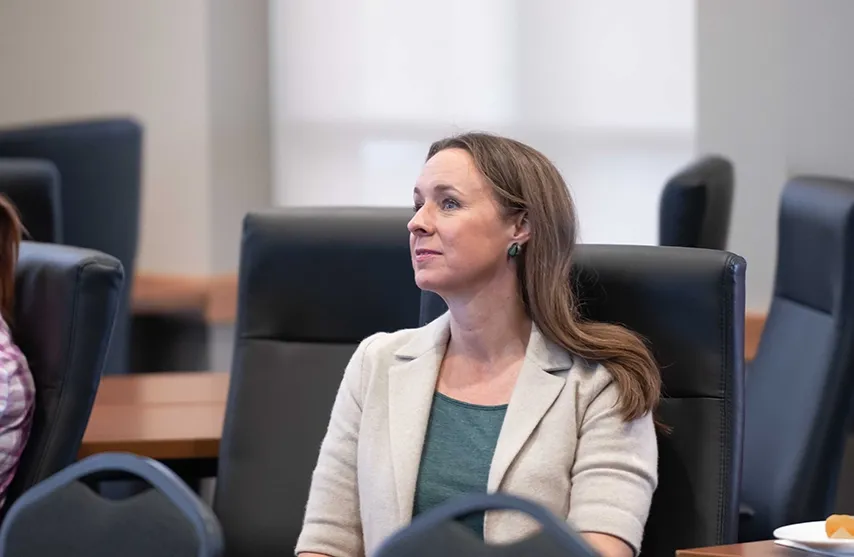Aaron Wikle, a St. Ambrose University graduate from Orion, Illinois, has been awarded a prestigious National Science Foundation Graduate Research Fellowship.
Wikle, who earned his St. Ambrose Bachelor of Science in Biology degree with magna cum laude honors in the spring of 2019, was among 2000 recipients for the NSF fellowship chosen from among more than 12,000 applicants nationwide.
He follows recent SAU engineering graduates Justin Keister and Victoria Volk in winning the valuable NSF Graduate Research Fellowship. Keister, a 2016 graduate from Orangeville, Ill., is attending graduate school and doing graduate research at Florida State University. Volk, a 2017 graduate from Tremont, Ill., is pursuing her graduate degree and conducting graduate research at Boise State University.
Fellowship alumni include seven Nobel prize winners for physics, including current U.S. Secretary of Energy Steven Chu. Other past winners are Eric Maskin, a Nobel Laureate in Economics; Sergey Brin, a co-founder of Google; and University of Chicago economist Steven Levitt, a co-founder of the top-selling book Freakonomics. The fellowship fully supports three years of graduate school, including partial tuition and a salary stipend for research as a graduate assistant. As of 2019, anticipated awards totaled $138,000. The NSF Graduate Research Fellowship supports over 100 sub-disciplines including social sciences, psychology, and STEM.
Wikle plans to attend the University of Denver, where he will continue the research he began as an undergraduate student in 2018 under the direction of SAU Assistant Professor of Biology E. Dale Broder, PhD. He said the opportunity to engage in research at St. Ambrose helped his passion surface and changed his career path.
"That was definitely Dale," Wikle said. "Prior to meeting her, I was kind of on the path to a healthcare career. I come from a family of healthcare workers and hadn't really experienced doing research before that."
Broder came to St. Ambrose from the University of Denver, where she previously worked alongside Robin Tinghitella, PhD, a behavioral ecologist whose work led to the discovery of a species of male crickets who purr rather than chirp to attract mates.
Those purring crickets have been found only on four islands in the south Pacific, including the Hawaiian island of Molokai, where Wikle has accompanied Broder and Tinghitella to conduct research each of the past two field seasons.
Broder said the particular species of cricket originated in Australia, but "island hopped" to Molokai and other nearby islands. There, the male's chirping call to potential mates attracted the attention of parasitoid flies that had "island hopped" from California. The chance meeting put the crickets in peril, as the flies sprayed lethal larvae on the male crickets.
Because they escaped parasitoid flies, the silent male morphs persisted alongside typically singing males. "Maybe 15 to 17 years after the silent morph evolves, we get the emergence of this third morph," Broder explained of the purring males. "It's probably better than silence for attracting females and it seems to be better than the typical song for avoiding being eaten by flies."
During the past two field research trips, Broder and Wikle have studied a new mode of communication in these purring crickets - when males court females they actually send vibrations through the ground.
Broder and Wikle have co-written a paper titled "Substrate-borne Vibration in Pacific Field Cricket Courtship Displays," which is currently receiving its second review by the Journal of Orthoptera Research.
Undergraduate student research opportunities are expanding at St. Ambrose University and come with the added benefit of direct faculty-student interaction.
Wikle is the son of Paula Wikle. He graduated from Orion High School in 2013 and earned an associate degree from Black Hawk College. When he first enrolled in a large state university to complete his undergraduate studies, he said he was overwhelmed by the large class sizes. At St. Ambrose, he found the 12-1 student to faculty ratio created a better learning environment.
"At St. Ambrose, you get the one-on-one conversations you want to have," he said. "Faculty members are a lot more accessible and you are able to more easily cultivate a relationship."
Keister and Volk participated in the Undergraduate Summer Research Institute at St. Ambrose and worked closely outside the classroom with engineering faculty.
Paul Koch, PhD, provost and vice president for academic and student affairs at St. Ambrose, said research opportunities such as the one Wikle experienced in partnership with Broder build upon the university's academic strengths.
"As an institution that has always prided itself on creating effective learning environments inside and outside of the formal classroom setting, active student engagement in scholarship is a phenomenal way for students to not only demonstrate skills but also to continue the learning process and help to expand on existing bodies of knowledge and create new knowledge," Koch said. "As a result, St. Ambrose continually looks for opportunities to further engage students in either independent research or research with faculty members.
"Aaron's award is but one example of the outcome of our commitment to students."
Broder continues to engage SAU students of evolutionary biology in the study of the evolution of sub-strata mating communication, returning from annual December field studies on Molokai with eggs to create cricket lab in Lewis Hall.
"We are unique in providing these research opportunities within our courses," she said.


